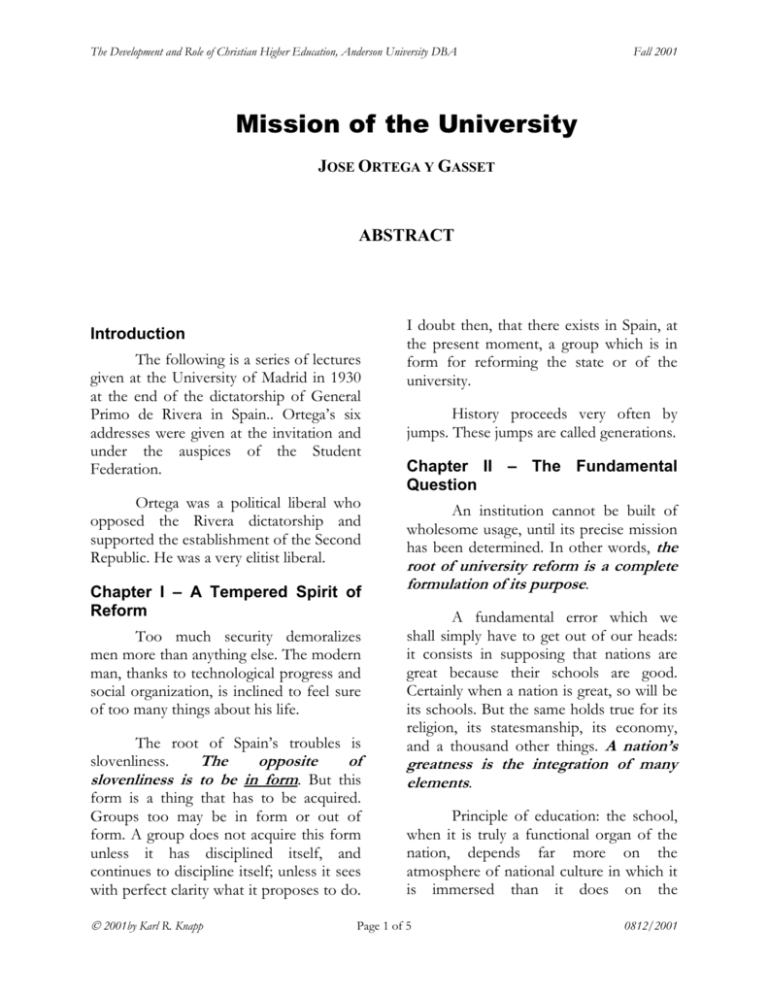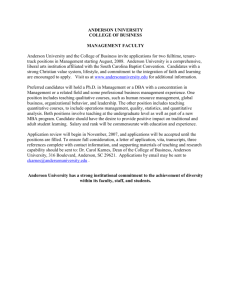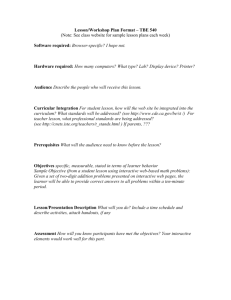Mission of the University
advertisement

The Development and Role of Christian Higher Education, Anderson University DBA Fall 2001 Mission of the University JOSE ORTEGA Y GASSET ABSTRACT Introduction The following is a series of lectures given at the University of Madrid in 1930 at the end of the dictatorship of General Primo de Rivera in Spain.. Ortega’s six addresses were given at the invitation and under the auspices of the Student Federation. Ortega was a political liberal who opposed the Rivera dictatorship and supported the establishment of the Second Republic. He was a very elitist liberal. Chapter I – A Tempered Spirit of Reform Too much security demoralizes men more than anything else. The modern man, thanks to technological progress and social organization, is inclined to feel sure of too many things about his life. The root of Spain’s troubles is slovenliness. The opposite of slovenliness is to be in form. But this form is a thing that has to be acquired. Groups too may be in form or out of form. A group does not acquire this form unless it has disciplined itself, and continues to discipline itself; unless it sees with perfect clarity what it proposes to do. 2001by Karl R. Knapp I doubt then, that there exists in Spain, at the present moment, a group which is in form for reforming the state or of the university. History proceeds very often by jumps. These jumps are called generations. Chapter II – The Fundamental Question An institution cannot be built of wholesome usage, until its precise mission has been determined. In other words, the root of university reform is a complete formulation of its purpose. A fundamental error which we shall simply have to get out of our heads: it consists in supposing that nations are great because their schools are good. Certainly when a nation is great, so will be its schools. But the same holds true for its religion, its statesmanship, its economy, and a thousand other things. A nation’s greatness is the integration of many elements. Principle of education: the school, when it is truly a functional organ of the nation, depends far more on the atmosphere of national culture in which it is immersed than it does on the Page 1 of 5 0812/2001 The Development and Role of Christian Higher Education, Anderson University DBA pedagogical atmosphere created artificially within it. A condition of equilibrium between this inward and outward pressure is essential to produce a good school. Each generation struggles for fifteen years to establish itself, and its synthesis holds together another fifteen years – inevitable anachronism of an imitative, unauthentic people. It is of the first importance to these societies, therefore, that these professional people, aside from their several professions, possess the power to make their lives a vital influence, in harmony with the height of their times. Hence it is imperative to set up once more, in the university, the teaching of the culture, the system of vital ideas, which the age has attained. This is the basic function of the university. This is what the university must be, above all else. Professionalism and specialism, through insufficient counterbalancing, have smashed the European man in pieces – created a professional barbarian. We come to the conclusion therefore that the university’s teaching comprises these three functions: 1. The transmission of culture 2. The teaching of the professions 3. Scientific research and the training of new scientists Instead of teaching what ought to be taught, according to some Utopian desire, we must teach only what can be taught; that is, what can be learned. In education there are three elemental factors: what is taught (knowledge, wisdom), and the teacher and 2001by Karl R. Knapp Fall 2001 the learner. Yet with peculiar blindness, education has centered about knowledge and the teacher. The learner was no factor in pedagogy. The innovation of Rousseau and his successors was simply to shift the center of gravity of the science from knowledge and the teacher to the learner, recognizing that it is the learner and his characteristics which alone can guide us in our effort to make something organic of education. Chapter III – The Principle of Economy in Education Economic science necessarily responds to the fundamental principle underlying the economic activity of man. Scarcity is the basis of economic activity. Scarcity of the capacity to learn is the cardinal principle of education. It is necessary to provide for teaching precisely in proportion as the learner is unable to learn. The fact is that education appears among primitive peoples in an inverted form: the vocation of teaching is actually one of concealing. The sacred formulas are conserved as secrets, and passed on esoterically to a chosen few. Whence the universal phenomenon of secret rites. All primitive education in which there is little to teach, is esoteric and secretive. Education comes into being, then, when the knowledge which has to be acquired is out of proportion to the capacity to learn. It is urgent therefore that we base our science of teaching, its methods and institutions, upon the plain, humble principle that the child or the youth who is to be the learner cannot learn all we should like him to know – the principle of economy in education. Page 2 of 5 0812/2001 The Development and Role of Christian Higher Education, Anderson University DBA The principle of economy in education not only implies that it is necessary to economize in the subject matter offered. The construction of the university must be based upon the student. The university must be the projection of the student to the scale of the institution. And his two dimensions are, A. B. first what he is – a being of limited learning capacity – and second, what he needs to know in order to live his life. How are we to determine the body of subjects which are to constitute the torso or minimum of the curriculum? By submitting the present conglomeration to two tests: 1. We must pick out that which appears as strictly necessary for the life of the man who is now a student. 2. What remains, having been judged strictly necessary, must be further reduced to what the student can really learn with thoroughness and understanding. Chapter IV – What the University Must Be Primarily: the University; Profession and Science We have come to the following propositions: C. D. Fall 2001 The university consists, primarily and basically, of the higher education which the ordinary man should receive. It is necessary to make of this ordinary man, first of all, a cultured person: to put him at the height of the times. It follows then, that the primary function of the university is to teach the great cultural disciplines, namely: 1. The physical science of the world (Physics) 2. The fundamental themes of organic life (Biology) 3. The historical process of the human species (History) 4. The structure and functioning of social life (Sociology) 5. The plan of the universe (Philosophy) It is necessary to make the ordinary man a good professional. There is no cogent reason why the ordinary man needs or ought to be a scientist. Scientific investigation, does not belong in any direct, constituent capacity among the primary functions of the university. It is something independent. (In its proper and authentic sense, science is exclusively investigation. It is not a science to learn or teach a science, or to apply and appropriate science.) The real scientist, considered as a person, has been with notorious frequency a visionary and a freak, when he has not been absolutely demented. The teaching of the professions and the search for truth must be 2001by Karl R. Knapp Page 3 of 5 0812/2001 The Development and Role of Christian Higher Education, Anderson University DBA separated. The trend toward a university Fall 2001 The man of science can no longer dominated by “inquiry” has been disastrous. It has led to the elimination of the prime concern: culture. afford to be what he has now is with lamentable frequency – a barbarian knowing much of one thing. Chapter V – Culture and Science It has come to be an imminent problem, one which mankind can no longer evade, to invent a technique adequate to cope with the accumulation of knowledge now in our possession. Science consists in an urge to solve problems; the more it is engaged in this occupation, the more purely it accomplishes its mission. In our age the content of culture comes largely from science. But our discussion suffices to indicate that culture is not science. Culture does with science, therefore, the same thing the profession does. It borrows from science what is vitally necessary for the interpretation of our existence. The need to create sound syntheses and systematizations of knowledge, to be taught in the “Faculty of Culture”, will call out a kind of scientific genius which hitherto has existed only as an aberration: the genius for integration. Accordingly, science grows constantly more diversified and specialized without limit and is never completed. But culture is subservient to our life here and now, and is required to be, at every instant, a complete, unified, coherent system – the plan of life, the path leading through the forest of existence. The primary mission university in this wise: What we call today a “cultured man” was called more than a century ago “an enlightened man,” i.e. a man who sees the paths of life in a clear light. Hence the historical importance of restoring to the university its cardinal function of “enlightenment”, the task of imparting the full culture of the time and revealing to mankind, with clarity and truthfulness, that gigantic world of today in which the life of the individual must be articulated, if it is to be authentic. Personally, I should make a Faculty of Culture the nucleus of the university and of the whole higher learning. 2001by Karl R. Knapp Chapter VI – What the University Must Be “In Addition” of the 1. University, in the strict sense, is to mean that institution which teaches the ordinary student to be a cultured person and a good member of a profession. 2. The university will not tolerate in its program any false pretense: it will profess to require of the student only what actually can be required of him. 3. It will consequently avoid causing the ordinary student to waste part of his time in pretending that he is going to be a scientist. To this end, scientific investigation proper is to be eliminated from the core or minimum of the university. 4. The cultural disciplines and the professional studies will be offered in a rationalized form based on the best pedagogy and not in the form which science would prefer, if it were left to Page 4 of 5 0812/2001 The Development and Role of Christian Higher Education, Anderson University DBA itself: special problems, “samples” of science, and experimentation. 5. The selection of professors will depend not on their rank as investigators but on their talent for synthesis and their gift for teaching. 6. When the student’s apprenticeship has been reduced to the minimum, both quantitatively and qualitatively, the university will be inflexible in its requirement of him. Around university, the camps – their and discussion the soil out of the central part of the sciences must pitch their laboratories and seminars centers. The sciences are which the higher learning 2001by Karl R. Knapp Fall 2001 grows and from which it draws its sustenance. All normal university students will come and go between the university and these outlying camps of the sciences, where they will find courses conceived from an exclusively scientific point of view, on all things human and divine. Of the professors, those who are more amply gifted will be investigators as well, and the others, who are purely teachers, will work none the less in closest contact with science, under its criticism and the influence of its ferment and stimulation. The university and the laboratory are distinct, correlative organs in a complete physiology. Page 5 of 5 0812/2001







